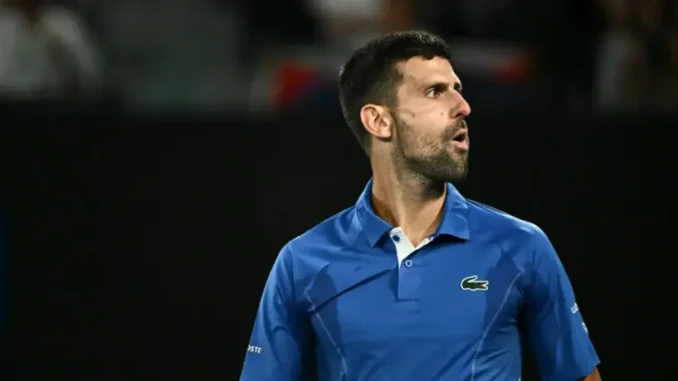
The world of professional tennis often finds itself at the intersection of high-stakes competition, intense scrutiny, and complex regulations. Recently, a debate ignited surrounding Jannik Sinner and the handling of concerns related to him, drawing in none other than Novak Djokovic, whose comments sparked a sharp response from a leading figure in the World Anti-Doping Agency (WADA). Djokovic’s remarks, suggesting preferential treatment in Sinner’s case, have been met with a firm rebuttal, highlighting the complexities and sensitivities surrounding anti-doping procedures.
Djokovic, a vocal advocate for clean sport, expressed his concerns, raising questions about the transparency and consistency of anti-doping measures. His comments, while not explicitly detailing the specifics of Sinner’s situation, hinted at a perception of favoritism, suggesting that some athletes might receive more lenient treatment than others. These claims, coming from such a prominent figure in the sport, quickly gained traction, fueling discussions and raising eyebrows within the tennis community.
“It’s important to have transparency and consistency in anti-doping,” Djokovic had stated, his words reflecting a broader concern about fairness in sport. “Everyone should be treated equally, regardless of their status or popularity.”
However, a high-ranking official within WADA has responded forcefully to Djokovic’s insinuations, defending the organization’s handling of the situation and emphasizing the rigorous and impartial nature of their procedures. The WADA representative, speaking with authority on the matter, dismissed any notion of preferential treatment, asserting that all athletes, regardless of their stature, are subject to the same rules and regulations.
“There is absolutely no favoritism in how WADA handles cases,” the official stated emphatically. “Our procedures are designed to be fair and objective, and we apply them equally to all athletes.”
The WADA representative further explained the intricate processes involved in anti-doping investigations, emphasizing the importance of due process and the protection of athletes’ rights. They highlighted the confidential nature of ongoing investigations, explaining that details cannot be publicly disclosed until certain stages are completed. This confidentiality, while sometimes perceived as a lack of transparency, is crucial for ensuring the integrity of the process and safeguarding the reputation of athletes.
“We understand that there can be a perception of a lack of transparency,” the official acknowledged. “But it’s important to remember that these investigations are complex and sensitive. We have to balance the need for transparency with the need to protect the rights of athletes and the integrity of the process.”
The WADA representative also addressed the specific concerns raised about Sinner’s case, reiterating that there was no evidence of any wrongdoing on the part of the Italian player. They emphasized that any speculation or insinuations of preferential treatment were unfounded and potentially damaging to the athlete’s reputation.
“Jannik Sinner is a clean athlete,” the official declared. “There is no evidence to suggest otherwise. Any suggestion of favoritism in his case is simply not true.”
The exchange between Djokovic and the WADA official highlights the ongoing debate about transparency and fairness in anti-doping. While athletes like Djokovic are understandably concerned about ensuring a level playing field, organizations like WADA must balance this concern with the need to protect the integrity of their processes and the rights of individual athletes. The delicate balance between transparency and confidentiality is a constant challenge, and it’s not always easy to satisfy everyone.
“It’s a complex issue,” the official admitted. “We’re always striving to improve our processes and to be as transparent as possible, while still maintaining the integrity of our investigations.”
The controversy surrounding Sinner’s case serves as a reminder of the intense scrutiny that athletes face, especially those at the top of their game. It also underscores the importance of responsible reporting and the need to avoid spreading misinformation or speculation that could harm an athlete’s reputation. In the age of social media, where rumors can spread rapidly, it’s more important than ever to rely on credible sources and to exercise caution before drawing conclusions.
“We encourage everyone to be responsible in their reporting and discussions of these issues,” the official urged. “Unfounded accusations can have serious consequences for athletes.”
As the debate continues, one thing remains clear: the fight against doping in sports is an ongoing battle, requiring constant vigilance, collaboration, and a commitment to fairness and transparency. The exchange between Djokovic and WADA underscores the complexities of this battle and the importance of open dialogue and constructive criticism. Ultimately, the goal is to ensure a level playing field for all athletes and to protect the integrity of sport. And in the case of Jannik Sinner, the message from WADA is clear: there is no evidence of wrongdoing, and any suggestion of favoritism is simply unfounded.
Leave a Reply